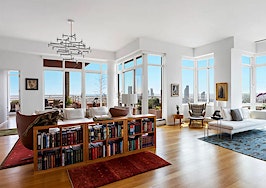Join the exceptional and become a Sotheby's International Realty agent.
Learn More
In 2020, one of the most transformative trends in the luxury real estate industry was the mass movement of buyers from urban centers to suburban or vacation markets. It seemed as though everyone was fleeing their condos in the city to find more space, both indoors and outdoors.
Of course, we know that’s an oversimplification. Here in Vancouver, Canada, the downtown core has the potential to be much the same vibrant place it was pre-pandemic. The same can be said for city centers worldwide. The culture and convenience of cities mean they have always been desirable places to own property, and that won’t change—particularly as markets continue to normalize.
The first quarter of 2020 was looking like a boom year for luxury real estate, which made it all the more jarring when markets came to an abrupt halt through Q2 and Q3. But by July, businesses had reopened with new safety protocols and people were slowly becoming more comfortable resuming their normal activities. By Q4, the market was showing a renewed robustness.
So luxury real estate agents shouldn’t discourage their buyers from acquiring property in the big city. In fact, there are four reasons why the first half of 2021 may prove to be a good time for those looking to find a property downtown.
1. Lifestyle still tops the client wish list
When you live on Vancouver’s downtown peninsula, you can walk to a lot of pretty amazing places in fifteen minutes or less—from the beaches of English Bay to the forests of Stanley Park, from world-class shopping to your favorite local coffee shop. Urban centers across the globe offer similar excitement and variety, and luxury clients aren’t just going to give that up. A year from now, they’ll still want restaurants, bars, theaters, and parks on their doorstep.
But the definition of luxury living has indeed been impacted over the past year. When you live in a building with hundreds of units and suddenly elevator capacity is capped at two people, it’s a liability. No one wants to queue up to take out their garbage or retrieve their groceries, nor do they want to compete for space in amenities such as pools and gyms.
So as you bring your buyers to the city, bear in mind that there’s a new set of value-adds. Is the development you’re showing them sufficiently low density? Does it feature a 24-hour concierge service for door deliveries, including cold storage for items that have to be refrigerated? It’s considerations like these that enable high-end clients to feel comfortable investing in city real estate without having to compromise.
2. Change brings windows of opportunity
As we mentioned before, 2020 was remarkable because of the significant migration away from cities as people realized that they needed more space than their one-bedroom condos. Many people also began working remotely, meaning they no longer needed to live close to the office and could suddenly afford to move to a detached home further out of town.
But when everyone else zigs, you can encourage your clients to zag. As activity remains high in markets beyond the city center, it’s likely that the average price of a detached home will rise in the next six months. Meanwhile, clients who have always dreamed of living downtown can enjoy a lack of competition that’s unprecedented in recent memory.
3. Buyers may find they have more time
Now that the purchase of luxury downtown inventory has slowed slightly, buyers actually have time to think through a potential purchase, do their due diligence, and truly understand what the next five years will look like. Here in Vancouver, this hasn’t been the case for several years—people used to be able to spend more time considering their next television than their next home.
With a decrease in demand, sellers have a greater willingness to negotiate, buyers’ dollars go farther, and it’s possible to find your clients an advantageous purchase price.
But that doesn’t mean it’s all bad news for luxury sellers, especially in the higher end of the urban market. In uppermost price brackets here in Vancouver, prices have not fluctuated notably. Typically, the sellers in these premier residences are not in a hurry to divest themselves of their properties and are content to wait while the market recovers.
4. Markets will find equilibrium
It’s important to remember that the market will recover. When our team first began working together in 2008, global markets had just crashed and our clients were in a panic, trying to figure out their next course of action—not unlike what they’ve been going through this past year. And in both cases, it has been our job to counsel them and provide reassurance that while market abnormalities may sometimes occur, normality returns.
Panicked sellers are motivated sellers, but we must always caution against impulsive decisions. Luxury clients are sophisticated and know when they’re being taken advantage of—and they won’t make the mistake of doing business with self-serving agents. Provide the best information, know your product and your market better than anyone else, and be a trusted advisor.
At the end of the day, we’re building our businesses based on relationships. Invest in your current clients, and even in a scenario where you don’t achieve a sale in the city, you’ll be paving the way for future business.

Will McKitka and Kevin Hardy
With a combined 45 years of experience, Will McKitka and Kevin Hardy know luxury real estate. They set themselves apart from the 14,000 REALTORSⓇ in Greater Vancouver by how they market their properties, how they serve their clients, and how they showcase their expertise in the market today. They have combined their in-depth knowledge of traditional and digital advertising with the distribution of the Sotheby’s International Realty brand.









